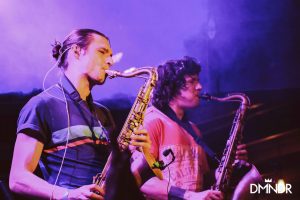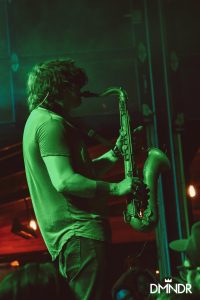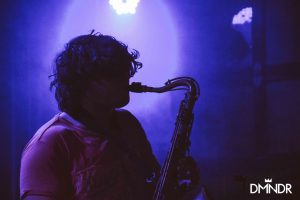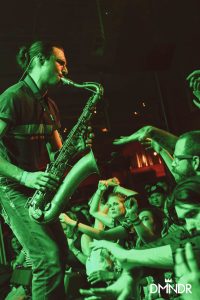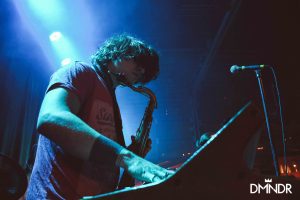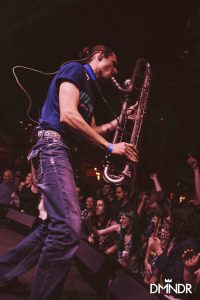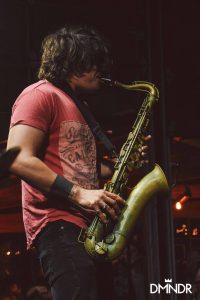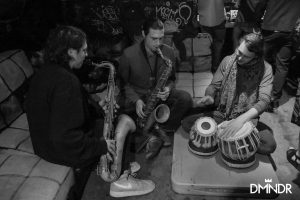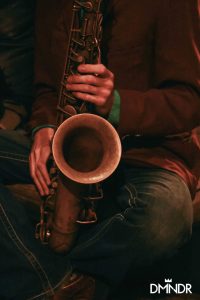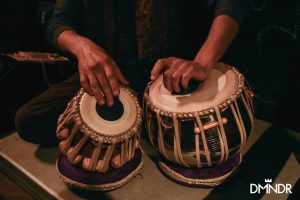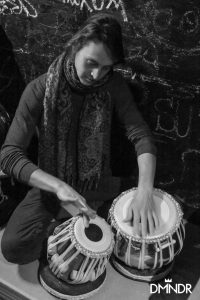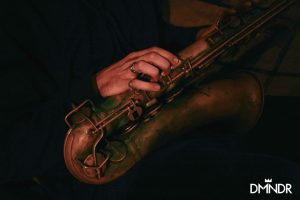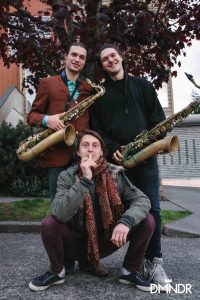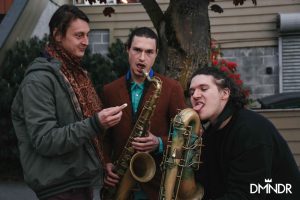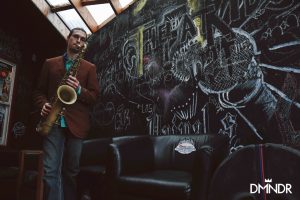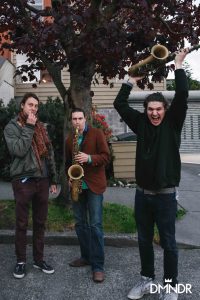At every Moon Hooch show I’ve ever been too (and I’ve been to quite a few) the crowd has lost their mind in the most wonderful way possible. Their music is brimming with an energy and liveliness that spills over into the crowd; it resonates from the stage, and you can almost see tangible energy and power flowing between the musicians and their instruments. They awaken a raw, almost animalistic desire in people to dance and let go of their inhibitions. The first time I saw them perform I was astounded at how they turned a very sleepy, late-night festival crowd, into a raging joyous dance floor, and since then I have remained fascinated with how this band creates such a unique sound that doesn’t fit into any specific genre. They bring people together in a magical concert experience; Wenzl McGowen and Mike Wilbur’s horns paired with James Muschler’s drums creates a dialogue between musicians and crowd, bringing everyone up to a level of understanding and communication that transcends language. I decided an interview would be a cool way to better understand where their music comes from, and this weekend I had the pleasure of talking on the phone with Wenzl and then spending some time with the band before their sold out show in Seattle. We delved into what it’s like to be in a band, into meditation, philosophy, science, politics, and Wenzl’s personal growth as a musician and spiritual human.
Rachel: Ok so I just have a few questions, I think you guys are really cool and I’m stoked to be talking to you.
Wenzl: Likewise.
R: My first question is about the name of the band, where did that name Moon Hooch come from?
W: I’m not sure where it comes from, it definitely randomly came to us. It wasn’t like we really thought about it; we didn’t intentionally form a band, we were just playing on the subway platform trying to make some money, and people would ask us our name, and in time we did have more intention to form a band.
R: Cool so it just kind of came out of the universe.
W: Yeah exactly the whole band just kind of came out of the universe. It’s not really something we decided, it’s more like this energy that wants to be expressed on this planet that kind of recruited us for that purpose.
R: Awesome! So what’s one of the hardest things about being in a band?
W: That’s a great question! I think it is hard; you live and work together, your work is your life, your passion is your work. But I think a band is a simpler organizational model than most organizations in society. Because in society you go to work, and you have a boss or you are the boss, and there is a hierarchical structure. Where as I feel like a band often falls into a tribe kind of organization, and your band members become members of your tribe. Each person is more connected on a really really deep level; I feel like you’re still really foreign from somebody unless you literally spend every day together, working together and collaborating. Some deep emotional stuff comes to the surface that you might have not looked at in a long time, or might not have even known was there. And then there is a lot of opportunity for growth, and it’s necessary to be willing to do that; to look at yourself and humble yourself and experience intense emotions, and to express them and forgive yourself and forgive your bandmates and go through that over and over again. You work through your differences and grow yourself.
R: Do you guys ever fight?
W: Yeah, of course. I mean we don’t physically fight. We disagree and sometimes we just can’t stand each other. We spend so much time together that weird subconscious resentments happen, where it’s almost like you’re referencing the past subconsciously. You’re reminded of a past argument you’ve had and your body energetically responds in similar ways, which then triggers the other person to respond in similar ways. There is a lot of emotional entanglement that leads to arguments and fights. But that’s normal.
R: So how do you think that you guys have grown as musicians and as a band over the past few years as you’ve kind of taken off?
W: There are obviously two ways to look at how we’ve grown; you can look at external growth, like the recognition of others and the fact that our fan base has grown over the past couple years. We’re much more well known, play much bigger shows. But there’s also internal growth which sometimes has nothing to do at all with being recognized. There are musicians out there who are exploring the farthest depths of creative expression that are not recognized. But we’re trying to do both. And there are also people that are really famous that don’t grow as musicians, that don’t even try. For me, my personal growth and professional growth are very much intertwined with spiritual growth, with just becoming more aware of my own energy and being able to direct that energy with more purpose. I can play one note in so many different ways, put a lot of intention and emotion into one note, and I feel like that is how I become a more powerful professional; to play a couple notes but to play them with such intent that I actually touch the heart of the listener. And by touching the heart that means that they feel the emotion that I put in the note.
R: I read that you guys do a lot of yoga and mediation, is that something that you do when you’re on the road and do you feel like that helps your creative process?
W: Yes but we’re not like a cult where we’re in agreement about all of those things, we disagree and we have our own individual opinions and individual practices. At the moment I take meditation very seriously; I try and do between 1 and 3 or 4 hours a day, of just sitting and meditating. When we have some time off I’m going to go to a temple and study with some buddhist monks.
R: So previously did you just teach yourself meditation practices?
W: Yeah I’ve gone to retreats and I’ve learned vipassana meditation. The thing about meditation is that it’s so simple; I could tell you how to meditate in three seconds, but you just need to try starting it. A lot of people think that they would love to learn how to meditate one day, but then they don’t because they think it’s like this difficult thing they need to learn. But the most basic thing is focusing your breath, and if you can just be with your breath without having any thoughts, then you can meditate.
R: I feel like a lot of people don’t want to put in the effort because they have too many thoughts.
W: Yeah and I feel like when a lot of people start with meditation they have to kind of battle their mind; at my first meditation retreat I have a pretty serious battle with my mind. That part of you that is used to thinking, that is used to believing that it knows what reality is, that is used to being able to know the past and the future, tells you to remain in control when you try to stop thinking. When you start meditating seriously you kind of get out of that, and then almost your mind becomes something separate from you.
R: So do you think it helps your creative process?
W: Yeah it definitely does, because in performance that’s really what gets in the way. I feel like anybody is a great performer if they can just shut off their mind. But people will go on stage and then have stage fright and be thinking, what do other people think about me? Does this sound any good? Or, there’s not enough people here, bla bla bla bla it doesn’t sound good. There are so many ways of judging the situation during a performance that can rip you out of the flow and deduct from your ability to perform. So I feel like meditation has definitely allowed me to hit the stop button on my thoughts and just go into the flow, and to express on a deeper level and be focused on a level beyond thought.
R: How do you feel about the band’s newest album Red Sky compared to your older work? Do you think it’s different? Do you think your music has evolved?
W: Yeah we’ve definitely become quite different musicians. If you listen to the first album and then Red Sky, they sound like very different musicians, just playing very differently. All of us have kind of gathered repertoire and I think we’ve all gotten a lot better, just playing more precise when we’re playing together.
R: How much do you guys practice?
W: it varies, all of us practice different amounts. James probably practices the most, about two hours a day on each instrument, and he plays drums, tabla and saxophone. When he can he practices like 6-8 hours a day. I practiced 8 hours a day for about ten years, but right now I practice maybe an hour or two a day. But I also feel like a lot of my improvement as a musician is intertwined with my practice of meditation. And I’m also working on a book right now, so I spend a lot of time writing and researching.
R: What’s the book about?
W: It’s about a different way of looking at reality. On a fundamental level everybody makes the assumption that we are living in a world that is made up of matter. Even scientists make that assumption, it seems that way so we all believe it is that way. But then on a subatomic level that’s not what we find. That’s why quantum physics has baffled scientists for nearly a century, because when we observe subatomic particles, our observation of them changes them; the observation itself influences the outcome. We’re left with a huge paradox of how to make sense of that. I have interviewed many physicists who claim to have found a new way of looking at this problem with the idea of the assimilation hypothesis. The hypothesis is the idea that reality is made up of information rather than being made of matter, and that consciousness is a fundamental ingredient of reality. Consciousness is not generated by matter, it’s the other way around. This kind of shifts the whole picture because suddenly what is it, is consciousness eternal then? That certainly becomes a possibility, and time and space and all the laws of this reality are sort of less fundamental than consciousness. I explore this hypothesis through the research of near-death experiences, past-life regression therapy, out-of-body experiences, and my own mystical experience. And then I make the argument saying that we have a fifty-fifty chance of choosing whether we believe that reality is totally made of matter, or whether we believe that information creates what we perceive as matter. If we have these two hypothesis and two belief systems, which one should we believe based on our own subjective experience? And then I look to the range of mystical experiences, the teachings of Buddha, the realizations of Plato, and the belief of shamans in the Amazon, which are all coherent if we dissect them. Like when Buddha says reality is an illusion, that really means reality is not matter, its information, its an experience, it’s not fundamentally real. So I kind of try to create the bridge between mysticism and science.
R: Wow that is fascinating! I would love to read that when you finish!
W: Yeah, I don’t know when I’m going to release it or how, or if I should release it; sometimes I think I shouldn’t release it until later on.
Random banter not necessary to the interview
R: At one of your past shows I remember you talking about some environmental advocacy work the band was doing and I’m wondering if you guys are still doing that?
W: Yeah, we are promoting animal rights, so we have flyers and we are all vegans. I think that being vegan is the easiest way to make an impact right away, because animal agriculture produces over 50% of the CO2 and greenhouse gases, much more than transportation. Being vegan helps to not contribute to that, and of course there is the health aspect; it’s healthier for yourself, and I think it’s extremely wrong and weird to raise an animal to kill it. There are just so many reasons to be vegan, and we promote that at our shows by talking about it and giving out flyers. We’re going to play at a permaculture festival this summer, called Permajam, where we will connect the fan base with perma-farming workshops, consciousness-expansion workshops, and educate them about a realistic and practical vision of a more sustainable future. We definitely try to align ourselves with that whenever we can, but at the same time we’re also driving a car and burning gas every day, so we are definitely still stuck in the system and part of it. But I think if you want to reach a lot of people and make a difference, you have to be part of the system in a way. If we just dropped everything and started foraging in the Amazon rainforest and living there, we would not be making any negative impact on the environment, but at the same time nobody would know and we wouldn’t be necessarily helping either. It’s definitely something I think about every day, that we’re still part of the system, especially when I see trash and how everything is wrapped in plastic packaging.
R: Do you guys live in New York City still?
W: We live wherever we want to live whenever we have time off; we’re kind of nomadic.
Me: I was gonna say, in New York, you definitely feel like you’re part of the system when you’re in that city.
W: Yeah, but even here. Anywhere really. You can’t escape it. It’s kind of crazy how far this country has spiraled out of control, while maintaining the belief that it’s normal. It’s pretty remarkable. Like if you go into a gas station and just look at the food there and all the products, they are so far from natural. Every little thing has 60+ ingredients and most of them you don’t even know what they are. It’s all just corporations trying to come up with the newest, most foreign chemical compound and package it in an attractive way. It’s just consumerism and marketing. It’s so absurd; sometimes I feel ashamed living here.
R: On that note I was going to ask, as advocates of social change and environmentalism and collaborative energy etc, do you have any thoughts or feelings about the current political climate?
W: I think that it’s like when you’re not feeling well for a couple months and then suddenly you have a tremendous disease and a huge infection on your leg, and the pus is dripping out and you’re like, oh shit I’m really sick. That’s kind of like what’s happening in this country. This toxic political climate has been building for years, for centuries really, and Trump is the wound that you can look at and see exactly what the problem is. I feel like he has embodied the disease so clearly and so bluntly, that there might be a good healing opportunity. It might be a step that is necessary, a step into darkness that you have to take in order to cross into the next realm.
R: Do you feel scared at all? Because I sure do!
W: I personally don’t feel scared, I’m not speaking for the band though, that’s just how I feel. Sometimes I feel very detached from everything, almost like i’m just watching it. I almost feel like I could just run into the forest and survive; I could leave everything behind and run into the forest, and meditate all day and forage and live wild. I don’t think I will ever do that in my life but I feel like I always have that as a last resort.
Hahaha both laughing
R: Ok I have one more question; as a successful musician and artist do you have any advice for other musicians and artist who are starting out and trying to live that creative life? And how do you push through the struggle?
W: I don’t really know. I have advice for myself, which is just focus on my own happiness and internal well being, but I can’t really make that a general rule of advice for everybody. And sometimes people need the struggle in order to learn get where they want to get. But I guess this is one bit of good advice, if you are a musician, don’t focus on fame; just focus on becoming the best that you can, and making that the goal. Be open for guidance by reading the signs and signals and following them with trust.
R: I think that’s good advice! I think that can apply to most things in life.
W: Yeah, trust is just so huge; trust that where you are right now is where you’re supposed to be, and even if there is struggle, even if it’s the most painful thing, there is something in that experience that will bring you to the next step. It can reveal a part of yourself that you might not have been able to see without the struggle.
